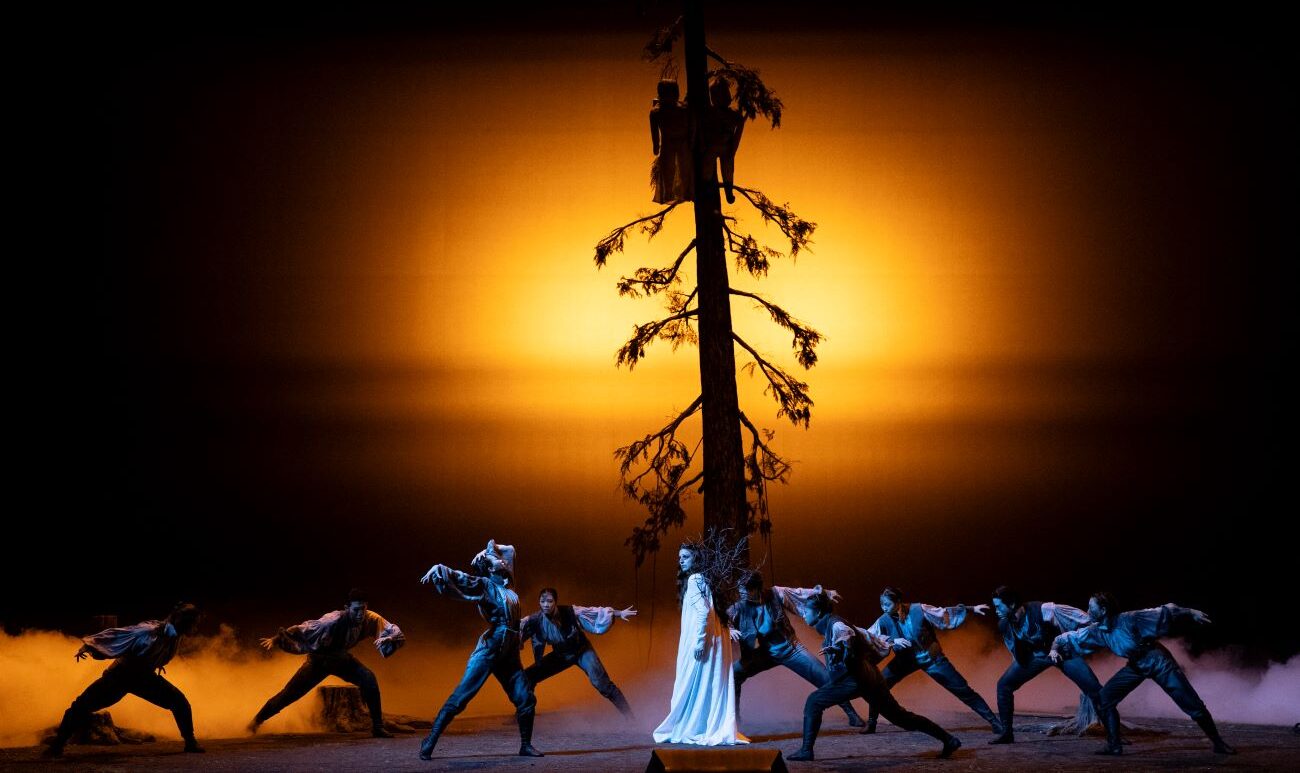Bárbara Lluch’s latest production of Bellini’s La Sonnambula at the New National Theatre Tokyo is an absolute triumph, a veritable feast for the senses. It was one of those rare evenings where the collective heartbeat of the performers, conductor, orchestra, and audience pulsated as one, culminating in an extended and exuberant curtain call—an embodiment of the visceral thrill that only live opera can deliver.
At the helm of this remarkable synergy was Maestro Maurizio Benini, whose masterful conducting infused the evening with a dynamic and refined energy. The Tokyo Philharmonic Orchestra responded to his baton with precision and verve, delivering a performance of immaculate balance, both in terms of volume and synchronisation with the singers. The orchestra’s sound was at once effervescent, embodying a finesse that elevated the entire production.
Antonino Siragusa’s portrayal of Elvino was nothing short of captivating. From the opening moments to the final curtain, his radiant tenor voice remained a beacon of stability and warmth. His portrayal of the jealous and anguished fiancé was deeply affecting, drawing the audience into the emotional turmoil of his character. Despite his long tenure on the opera stage, Siragusa’s voice retains a sensuous, lyrical quality that continues to enchant and move the listener.
Equally compelling was Claudia Muschio as Amina, whose performance imbued the character with a vulnerability and fragility that was utterly convincing. Her soprano complemented her delicate stage presence, creating a portrait of Amina that was both poignant and relatable. The chemistry between Muschio and Siragusa was palpable, their voices intertwining in soaring duets. Muschio, still early in her career, promises to be a talent to watch in the coming years.
Mutsumi Taniguchi’s portrayal of Teresa, Amina’s foster mother, added gravitas to the production, her charismatic presence providing a strong anchor for the supporting roles. Meanwhile, Hidekazu Tsumaya’s Rodolfo was a figure of commanding authority, bringing depth and solidity to the ensemble.
One of the most striking features of this production was the inventive use of modern dance, choreographed by Iratxe Ansa and Igor Bacovich, to explore Amina’s nocturnal world of somnambulism. The dancers, at times eerie and unsettling, at others ethereal and haunting, effectively mirrored Amina’s internal unrest. Their movements were sharp and expressive, offering a modern counterpoint to the traditional alpine village setting, and yet, this juxtaposition of old and new felt perfectly aligned. The choreography added layers of psychological complexity, revealing a darkness within Amina that transcended the surface innocence of the character.
Clara Bellufo’s costume designs were another standout element, evoking the claustrophobic and insular nature of village life. The stark, oppressive quality of the costumes underscored the suffocating atmosphere of a community where privacy is non-existent, and judgement looms large. The foreboding imagery of dolls shaped as bride and groom, suspended ominously from a tree, symbolised a sinister view of matrimony—a shadow of death haunting the union of Amina and Elvino. Amina’s wedding dress, far from embodying bridal purity and joy, exuded a ghostly unease, a chilling visual metaphor for her character’s plight.
This production of La Sonnambula seems to question the institution of marriage itself, casting doubt on whether the seemingly happy conclusion—Amina and Elvino’s marriage—is truly a moment of joy, or rather a continuation of Amina’s oppression. Such dark undercurrents lend a modern psychological depth to the narrative, making it a fascinating exploration of the complexities of love, trust, and societal expectation.
In sum, this La Sonnambula is an enthralling new take on a bel canto classic, offering both visual and emotional depth. Above all, the impeccable performances from the entire cast, the orchestra, and the creative team make this a world-class production that resonates long after the final note has been sung. A truly unforgettable experience.
New National Theatre Tokyo (https://www.nntt.jac.go.jp/english/)
Composer: Vincenzo Bellini (1801-1835)
Libretto: Felice Romani
Director: Bárbara Lluch
Conductor: Maurizio Benini
Set designer: Christof Hetzer
Costume designer: Clara Peluffo
Choreographer: Iratxe Ansa, Igor Bacovich
Cast includes Antonino Siragusa, Claudia Muschio, Hidekazu Tsumaya and Mutsumi Taniguchi
Venue: New National Theatre Tokyo in Tokyo
Photograph: © Rikimaru Hotta/New National Theatre, Tokyo
Running Time: 3 hours and 10 minutes (including 1 interval)
Until 14th October 2024

